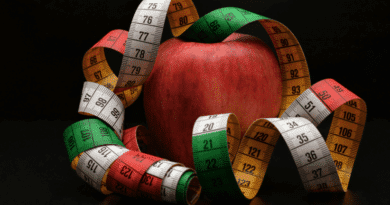6 Signs You’re Eating Too Much Sugar
Without realizing it, you very well may be taking in more sugar than you realize on daily basis. How many of you simply grab whatever food suits your mood and devour it? I can see quite a few hands in the air. If you aren’t tracking your nutrition, you really have no clue what macros you’re getting each day and could be eating too much sugar. You could be way off from where you need to be in order to reach your health/fitness goals. If you’re trying to lose weight, tracking your macros is a very simple way to see the pounds disappear. If you aren’t seeing those numbers going down on the scale, you need to make a change and tracking your nutrition will get you there.

Part of the reason why you aren’t losing weight is that you’re eating too much junk. Have you looked at the nutrition label of what you’re eating these days? I’m willing to bet a lot of the foods you’re looking at have either high sugar that you simply don’t care to worry about, or hidden sugar that you didn’t even realize was added to a so-called “healthy” food option. I doubt the fact that eating sugar is terrible for you comes as a surprise. If this is the first time you’re hearing you need to stay away from sugar, we have a long journey ahead of us. If you see any of the below signs, you’re probably taking in too much sugar.
The Bitter Truth: Unveiling the Negative Effects of Eating Too Much Sugar
In an era of convenient, processed foods and sugary delights, the phrase “eating too much sugar” has become more than just a casual concern. The ubiquity of sugar-laden treats has led to a surge in health issues, with medical professionals and nutritionists highlighting the dire consequences of indulging in excessive sugar consumption. From obesity to diabetes, dental woes to cardiovascular problems, the negative effects of eating too much sugar are far-reaching and demand our attention.
Obesity: A Growing Epidemic
One of the most evident outcomes of excessive sugar consumption is obesity. The relationship between sugar and weight gain is intricate, yet the evidence connecting the two is robust. Sugary foods are often high in calories but lack the satiety that comes from nutrient-rich alternatives. This can lead to overeating and a higher caloric intake, contributing to weight gain and eventually obesity. Moreover, high sugar intake can disrupt the body’s regulation of hunger and fullness, making it harder to maintain a healthy weight.
Diabetes and Insulin Resistance from Eating Too Much Sugar
Eating too much sugar also plays a pivotal role in the development of type 2 diabetes and insulin resistance. When we consume excessive amounts of sugar, the pancreas goes into overdrive to produce insulin, a hormone that helps regulate blood sugar levels. Over time, the body’s cells can become resistant to the effects of insulin, leading to elevated blood sugar levels—a hallmark of diabetes. This vicious cycle can eventually result in the onset of type 2 diabetes, a chronic condition with serious health implications.
Dental Decay: Sugar’s Effect on Oral Health
The negative impact of eating too much sugar extends beyond the waistline and into our oral health. Sugar serves as a feast for oral bacteria, which then produce acids that erode tooth enamel, leading to cavities and dental decay. The constant onslaught of sugar can also contribute to the development of gum disease, causing pain, discomfort, and even tooth loss. Oral health is a crucial but often overlooked aspect of overall well-being, and excessive sugar consumption directly threatens it.
Cardiovascular Complications
The toll of eating too much sugar isn’t confined to excess weight and diabetes—it also takes a toll on our cardiovascular health. A diet rich in sugar is linked to an increased risk of heart disease. High sugar intake can lead to high blood pressure, inflammation, and elevated triglyceride levels, all of which are risk factors for cardiovascular issues. This underscores the need to not only monitor our fat intake but also to pay close attention to our sugar consumption for the sake of a healthy heart.
Mental and Emotional Impact
While the physical effects of eating too much sugar are widely recognized, its impact on mental and emotional well-being is gaining attention. Consuming high amounts of sugar has been associated with mood swings, increased anxiety, and even depression. The rapid spikes and crashes in blood sugar levels caused by sugary foods can lead to emotional instability and worsen existing mental health conditions.
Stop Eating Too Much Sugar: Take Control of Sugar Consumption
Acknowledging the negative effects of eating too much sugar is the first step towards a healthier lifestyle. Making conscious choices about our diets can lead to positive changes that ripple through various aspects of our well-being. Opting for whole, unprocessed foods and reducing the consumption of sugary snacks and beverages can have a transformative impact on our health.
Major Signs You’re Eating Too Much Sugar
Are you unsure if you’re eating too much sugar throughout the day. Here are some signs to look for:
1. You constantly feel sluggish during the day due to sugar
I’m sure you’ve experienced the feeling of that “rush” of energy after you ate something high in sugar. You experience an almost instant “high” that allows you to push a little harder in the gym or during an activity but then you find just like in science class, what comes up, must come down. Unfortunately, this “down” creates a crash that will leave you feeling like you got hit by a ton of bricks. When it comes to energy, having stable blood sugar levels will ensure you have steady energy throughout the day and eating too much sugar does not allow for steady blood sugar. Once your insulin rises and falls, you will start to feel shifts in energy and those highs and lows will lead to not feeling like yourself—sluggish, tired, and lazy. Pay attention to your body, it won’t lie to you.
2. You seem to always crave sugary foods
It’s quite simple, the more you eat, the more you’ll want. Sugar is addictive eating too much sugar creates a brutal cycle that unless you can break it, you’ll go back and forth between wanting sugar, feeling satisfied, to right back to craving it again. Just like we mentioned in #1, this “drug” gives you that up and down feeling, leaving you wanting more to get back to the “high”. You’ll also find that your taste buds have changed—leaving you needing more sugar to get the same taste and satisfaction from foods.
3. You seem to be very moody like it’s your time of the month
If you’ve seen the Snickers commercials where they tell someone to eat a Snickers bar because they aren’t acting like themselves, that’s exactly what we are talking about with #3. You simply aren’t yourself because you’re eating too much sugar and it’s changing your emotional state. That up and down feeling you get from the sugar highs and lows causes you to have mood swings due to the changes in energy levels. When you’re coming down off of the sugar high, you can compare it to coming down from a high you got off of a drug. You’re moody and subconsciously craving that feeling of being high again.
Click here to continue reading…


*Disclosure: This article may contain affiliate links or ads, which means we earn a small commission at no extra cost to you if you make a purchase through these links. These commissions help support the operation and maintenance of our website, allowing us to continue producing free valuable content. Your support is genuinely appreciated, whether you choose to use our links or not. Thank you for being a part of our community and enjoying our content.
PLEASE CONSIDER SHARING THIS ON YOUR SOCIAL MEDIA TO HELP OTHERS LEARN MORE ABOUT THIS TOPIC.






